Life
6 Times That Eating Carbs Can Make You Feel Worse
Most people can agree: Carbs are delicious, but can be problematic to energy levels when eaten in excess or at inopportune moments. As timing does matter, knowing when you shouldn't eat carbs can help you maintain stamina, keep mood and emotions balanced, and feel at your best performance during the day. This doesn't mean you should never indulge, as eating complex carbs throughout the day is super important for wellbeing and bodily functions, so have no fear. Carbs are not the enemy.
That being said, as a certified health coach, I work with clients on keeping a healthy diet, one that nourishes them from the inside and out and powers them through the day. When you're not eating enough carbs, you might notice a drain in energy levels and worsened productivity, so you should be sure to get enough in the day; however, other times eating carbs can have the opposite effect, making you feel not so hot. To avoid feeling the latter, opting for protein or healthy fats instead of carbs at certain periods of the day could improve your overall wellbeing and drive. Here are 7 times when you shouldn't actually reach for that avocado toast or oatmeal.
1. When You Want To Reduce Bloat
This doesn't have to do with losing weight, but rather retaining water and feeling bloated and bogged down. "People should not eat carbs if they do not want to retain water. One gram of carbohydrates binds three grams of water, so if an athlete is trying to lose water weight for a weigh in or someone doesn't want to look bloated for pictures or an occasion such as a wedding, they might want to go easy on the carbs, just taking in enough for ready energy," explains personal trainer, coach, and powerlifter (and 18 time World Champion, 33 time National Champion, and member of the AAU Strength Sports Hall of Fame), Robert Herst, over email with Bustle.
2. Before A Workout (Sometimes)
Here, it depends on the fiber count. Eating carbs before a workout can provide quick energy to help boost performance, but eating complex carbs that are too high in fiber can lead to tummy distress, says Hope Pedraza, a Certified Personal Trainer, over email with Bustle. "Choosing carbs that do not have a substantial amount of fiber are best so that your body can metabolize it easily," says Pedraza. This could be a banana or a bagel with peanut butter, for instance.
3. When You Aren't Active At All
Sure, eating complex carbs before and after a workout is ideal, as your body needs it for that energy boost before the workout and for muscle recovery post-workout (along with enough protein), says Herst, but when you're not working out and you're just eating carbs at a meal, you need to be careful of the glycemic count, says Pedraza. "When you are eating a meal not centered around workout you want the carbs you are eating to be low glycemic carbs (those that are not going to cause a spike in insulin) to stabilize energy and blood sugar. These are things like quinoa, grown rice, oats and other whole grains that are full of fiber and other nutrients," says Pedraza.
4. Before A Busy Workday
If you have a big meeting coming up in the morning, where you need to be on your game and mentally alert, you might want to go easy on the carbs and heavy on the protein and healthy fats, instead. "Many people describe feeling fatigued and low energy after a heavy carbohydrate meal. I advise patients to minimize carb intake at breakfast and lunch," says Dr. Jennifer Haythe an M.D. and Cardiologist for the Center for Advanced Cardiac Care over email with Bustle. Of course, eating in small doses throughout the day is smart, but if you're heading to a big work presentation or meeting, you'll want to limit intake.
5. Late At Night
You might want to ditch that late night cookie. "When carbs are ingested, they are broken down into glucose. Our pancreas gets an alert to create insulin in order to carry that glucose through our bloodstream and into our cells to be used by the body for energy and recovery," says Crysten Crockett, trainer and health coach at VIBE5 Yoga and Fitness over email with Bustle. This means you'll go to sleep with all of this extra energy that your body isn't going to use and can't burn off.
6. When You're Not Eating Other Nutrients With It
Here's the thing: Your food combinations play a big role in making sure you don't spike your insulin when eating carbs, says Crockett. "Combining protein and fiber with your carbs can help balance your blood sugar, and make sure you have the fuel you need without crashing or craving later in the day," says Crockett. What's more, adding healthy fats can also slow digestion and fill you up, keeping blood sugar levels balanced, as well.
7. When You're Diabetic
"For those who have blood sugar sensitivities such as Type 1 diabetes, Type 2 diabetes, and metabolic syndrome, carbs alone should not be your go-to snack choice," says Pamela Nisevich Bede MS, RD sports dietitian with Abbott’s EAS Sports Nutrition over email with Bustle. "While you need carbs in your diet, and make it complex (think whole grains, vegetables, fresh fruit, and dairy), you should work with your doctor or dietitian to design a meal plan that incorporates more lean protein, heart healthy fat, and moderate, planned carbs in order to keep your blood sugar levels steady and accommodate your medication plan (if any)," Bede says.
Getting in enough carbs in the day matters, as your body needs them to thrive and will suffer without adequate portions. Yet, time the meals well to reap the benefits and avoid any mishaps that can happen due to overconsumption.
